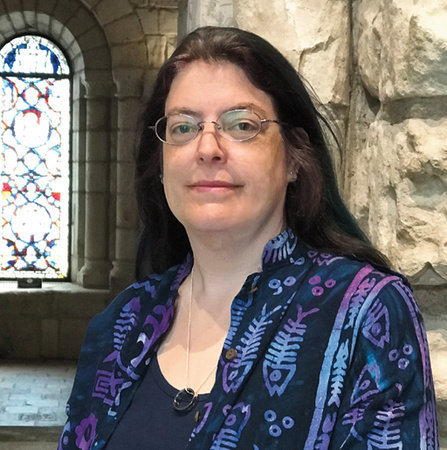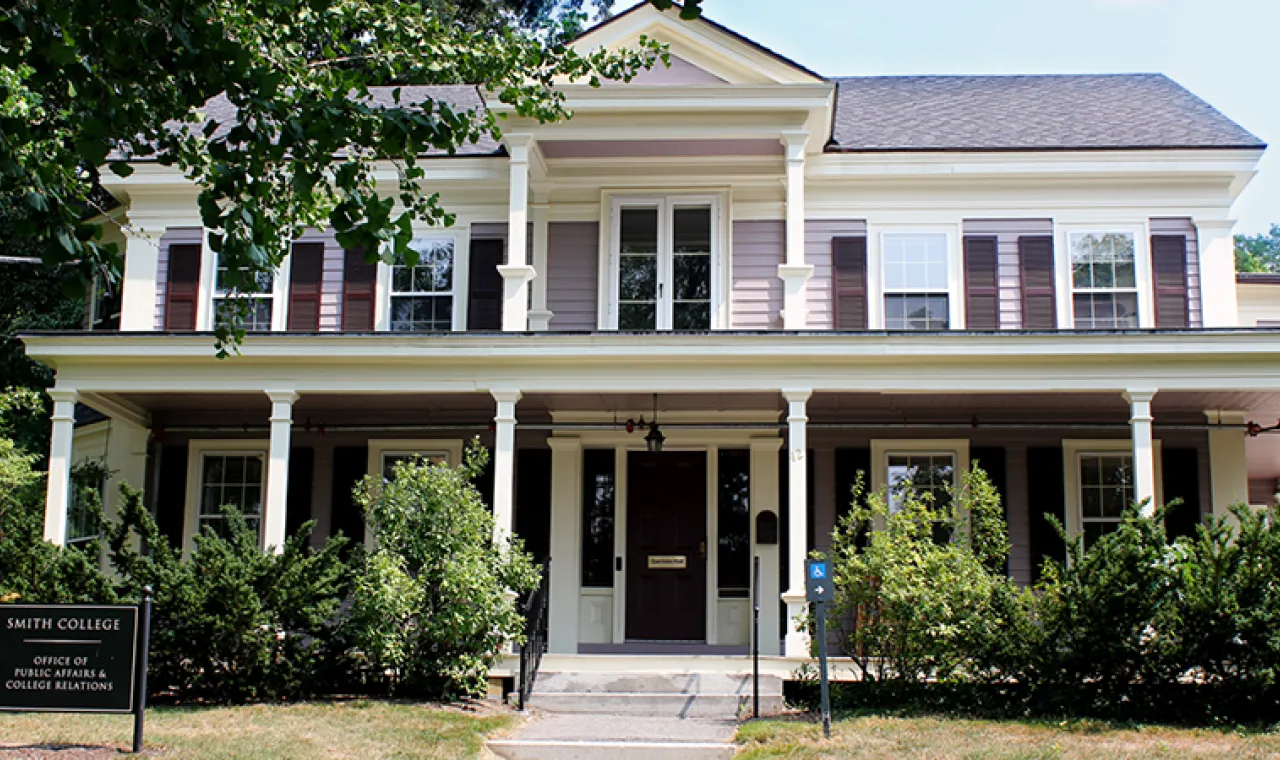
Suzanne Palmer is a Hugo Award-winning science fiction author who is also the Systems and Data Administrator for the Clark Science Center at Smith. I spoke with her about her creative background, the relationship between her job at Smith and her writing, and her advice for other Smith staff members pursuing creative work.
Staff Chronicle: First, what’s your background with writing? How did you start, and what have been some of your influences?
Suzanne Palmer: I got a fine arts degree from the University of Massachusetts, doing mostly sculpture. My sculpture had a heavy narrative component. For my thesis show I did a fake museum exhibit with artifacts from a made-up world. I think my switch to writing may have been inevitable just based on the amount of storage space needed for sculpture! I really started writing in 2001 as a way of dealing with having lost several coworkers on 9/11–it was a way to keep my brain occupied as I processed some of the trauma of those events.
I actually studied art also and I’ve noticed that while art-making never fully leaves my life, it can go pretty dormant for stretches. So I’m curious: What are the practical realities of your writing practice? What does your writing look like “on the ground?”
I’m a Linux system administrator, which is sometimes really effort-intensive and bleeds into weekends, so my writing mostly happens whenever I can catch a little window of time to work on stuff. A lot of the process of doing something is thinking about it, so I spend a lot of the day background thinking about projects, like when driving, grocery shopping, whatever. I’m low-level thinking about stuff all the time. It’s easier to get writing done on days when I haven’t been using my brain quite as much for other things, because it all comes out of sort of the same problem-solving bucket.
What is the relationship of your work at Smith to your writing work?
For me, the three pursuits of my life–sculpture, computer stuff, and writing–all are very interrelated in how they use my brain. Creativity and problem solving are things I’ve always loved and that cut across all three of those fields in similar ways, with the exception that art has a physical component to it that I miss sometimes. After sitting at a keyboard for so long, eventually I’ll get restless and have to go do something that uses that same part of my brain but that involves physically working with things.
In your story “The Secret Life of Bots” there’s a ship that has a human crew, but much of the action is about the physical infrastructure of the ship itself and the robots that help to run it–how the ship and the robots fit together into this whole and how the humans are depending on all of that, ultimately in a pretty major way. I’m wondering if any of that has a relationship to your work at Smith as a systems administrator and thinking about the underlying frameworks for how communications are enabled.
I’m a big lifelong nerd. I’ve had email or been online in one form or another since 1982, and I’ve been reading science fiction my whole life. I’ve always really been into robots, and I’m very interested in physical visual descriptions of things. With a certain amount of hindsight, part of the appeal of robots and AI is about the experience of being a neurodivergent person functioning in a world set up for neurotypical people. I wouldn’t say I went in intentionally wanting to play with that theme, but it’s subconsciously been a factor: processing the experience of the other, neurologically, and also trying to have fun with it.
Say there is a Smith staff member out there and they are thinking of taking up a creative pursuit more seriously. What is something you’ve learned that could be helpful to that person trying to get started?
If they’re specifically trying to write science fiction and go the traditional publishing route, come ask me. No one should have to reinvent the wheel. I believe really strongly in that. I’ve gotten where I am with a lot of generosity from writers further down the path. In a more general sense, I think we’re somewhat taught to avoid things we’re not sure we can do well, or can’t do well on the first try, but there’s an enormous amount of joy to be found in doing things you want to do and not caring whether anybody else likes it. If you can make yourself happy and then you want to seek external validation, that’s fine, but if you’re not making yourself happy, that comes across in what you’re doing.
I knew I was going to end up in computers, and I went to art school knowing art was not something I wanted to do as a profession. It was a personal growth thing. I had the privilege of being able to do that because I had computer skills. There’s a big stretch of IT where you can have a degree in some weird other thing and no one cares. One of the best IT people I ever worked with had a theater lighting degree. My boss at Smith has a geology master’s degree. Particularly with IT, a lot of it is about modes of thinking and problem solving as opposed to specific knowledge subsets.
I never had any great interest in becoming a successful artist, so it’s been interesting to have sort of accidentally become a writer and be getting all this external validation in a way that I had not been seeking in the pursuits I undertook intentionally. It’s sort of weird, and it also means I don’t feel a great sense of competition with other writers. The competition is internal–what can I do next, what can I do better? I think it’s a healthy way of interacting with your art, for the growth to be an internal thing.
It sounds like if you don’t feel a strong sense of external competition, you might be more willing to offer the same kind of help that you’ve gotten from other writers.
By and large the writing community is very supportive. It’s a pursuit where it’s easy to be isolated, but community is a big piece of what makes it worth pursuing. I have had the privilege of meeting many people through being a writer. I’ve gone places in the world I never thought I would go. I’ve taken two trips to China because of invitations from science fiction magazines there–and I can barely afford to go to Chicopee! It has opened up a huge world of people and communities, and that in some ways is the best part of the entire experience.
What is up next for you?
My fourth novel comes out in two weeks. It’s the last book in a series. That’s been a big push for a lot of years. I have some short fiction in the works, either being written or that I’m trying to find homes for. I’m working on my next novel, too. I tend to move back and forth between a bunch of projects.
Where should people go to learn more about you and find out more about your work?
I’m pretty Google-able. I have left Twitter because of Elon, but I’m on Bluesky. A fair bit of my short fiction is available for free online, and my books are out there somewhere. I’m sure my local booksellers would be happy to order copies of anything!
